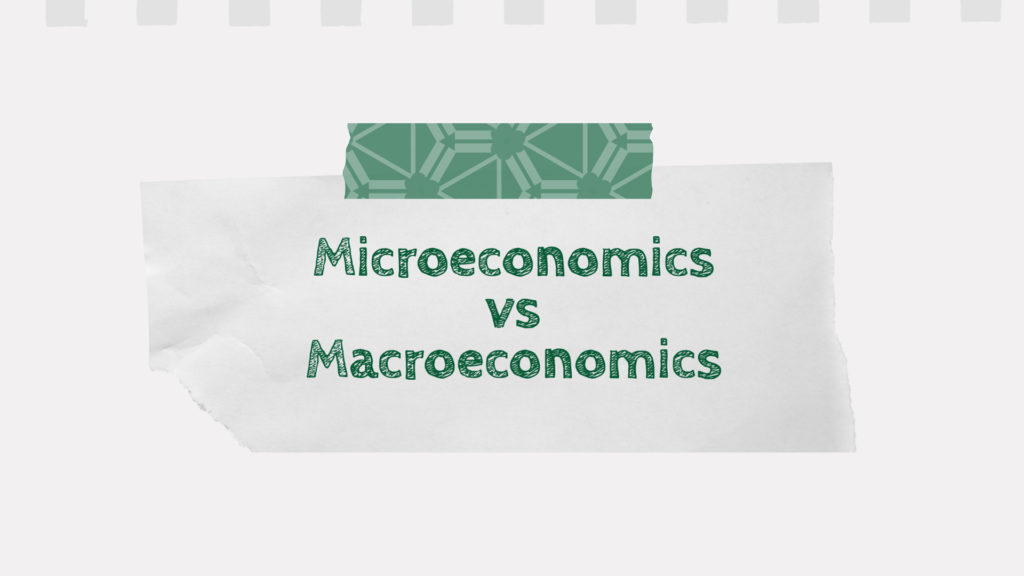Are you looking for an article to guide you with “Microeconomics vs Macroeconomics”?
In this article, you’ll find all the notes to know about the differences between microeconomics and macroeconomics of Class 11.
The difference between microeconomics and macroeconomics was one of those things that I just couldn’t understand during class 11. So I did some research and in this article, I’m going to share everything I learned with you.
Introduction
The term “microeconomics” and “macroeconomics” were coined and first used by a Norwegian economist and a professor of Oslo University, Ragnar Frisch, in the year 1933 AD. The terms ‘micro’ and ‘macro’ were derived from Greek words “mikros” and “makros” meaning “small” and “big” respectively.
Microeconomics may be defined as that branch of economic analysis that studies the economic behavior of individual economic units such as a person, a household, a firm, etc.
Macroeconomics, on the other hand, can be defined as that branch of economic analysis that studies the behavior of not one particular unit, but of all the economic units combined. Hence, McConnel observes, “Here we study forest, not the trees. It gives us a bird’s eye view of the economy.”
Differences between Microeconomics and Macroeconomics
The differences between Positive Economics and Normative Economics are mentioned below:
| Basis | Microeconomics | Macroeconomics |
|---|---|---|
| Definition | It is also called the “Theory of Income and Employment” or “Keynesian Theory.” | Macroeconomics, on the other hand, can be defined as that branch of economic analysis that studies the behavior of not one particular unit, but of all the economic units combined. |
| Origin & Development | It is a relatively old subject. It was developed by the pioneer of the classical school of thought, Adam Smith after the publication of “An Inquiry into the Nature and Causes of Wealth of Nation” in 1776 AD. | It is a relatively new subject. It was developed by John Maynard Keynes in his famous book “The General Theory of Employment, Interest and Money” in 1936 AD. |
| Etymological meaning | It is derived from the Greek word “mikros” which means “small.” | It is derived from the Greek word “makros” which means “big.” |
| Central Problem | It deals with the central problem of allocation of resources and related principles and policies. | It deals with the central problems of the determination of income and employment, full utilization and growth of resources, and related principles and policies. |
| Objective | Some major objectives of microeconomics are profit and utility maximization. | Some major objectives of macroeconomics are full employment, economic growth, income distribution, poverty alleviation, etc. |
| Suitability | It is suitable to study the problems of individual economic units. | It is suitable for the problems of the economy as a whole. |
| Known as | It is also known as “Price Theory” or “Value Theory.” | It is also called “Theory of Income and Employment” or “Keynesian Theory.” |
| Assumption | It is based on the assumption of full employment of resources. | It rejects the assumption of full employment. It is concerned with how resources can be fully employed. |
| Method of Study | It uses partial equilibrium analysis, i.e., it shows the effect of one factor or the study assuming other factors are constant. | It uses general equilibrium analysis as independence among macroeconomic variables. |
Conclusion
Though microeconomics and macroeconomics deal with different issues and subject matters, these are not completely distinct. These are complementary and different approaches to economic analysis. In the absence of one, the objective of the study of economics cannot be fulfilled.
If you read this article entirely and want to learn more about the basics of economics, read the articles given below.


Hello! I just would like to give a huge thumbs up for the great info you have here on this post. I will be coming back to your blog for more soon.
Oh my goodness! a tremendous article dude. Thank you Nonetheless I am experiencing subject with ur rss . Don’t know why Unable to subscribe to it. Is there anyone getting identical rss downside? Anyone who knows kindly respond. Thnkx
I was suggested this website by my cousin. I am not sure whether this post is written by him as no one else know such detailed about my trouble. You are wonderful! Thanks!
I like what you guys are up also. Such smart work and reporting! Carry on the superb works guys I?¦ve incorporated you guys to my blogroll. I think it’ll improve the value of my site 🙂
Thank you for the good writeup. It if truth be told was once a amusement account it. Look complicated to far introduced agreeable from you! By the way, how could we keep in touch?
Thanks! Shoot us an email to get in touch.